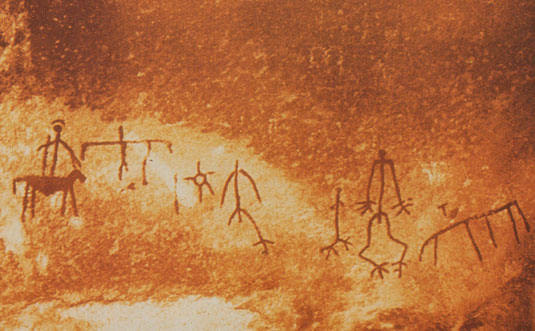THE FORGOTTEN ARTIST: Indians of Anza-Borrego and Their Rock Art [SOLD]
 Forward to Friend
Forward to Friend
- Subject: Southwest Anthropology and History
- Item # C3602H
- Date Published: Soft cover, first edition, 1988
- Size: beautifully illustrated, 116 numbered pages SOLD
THE FORGOTTEN ARTIST: Indians of Anza-Borrego and Their Rock Art
Soft cover, first edition, 1988, beautifully illustrated, 116 numbered pages
Published by the Anza-Borrego Desert Natural History Association
CONTENTS
The Land and its People
On the Trail of Early Man
The Cahuilla and Cupeño
The Northern Diegueño and Kumeyaay
Drawings with Hammer and Brush
Petroglyphs and Pictographs
Rock Art Styles of Anza-Borrego
Scribbles or Magical Images?
Ritual and Ceremonies Recorded on Stone
Fertility Signs
Initiation Rites for Girls and Boys
Sky People, Ghost Roads, and Flock of Geese
Ritual: Ever-present, all Important
Shaman, the Man Who Sees Beyond the Start
The Forgotten Artist
FORWARD
“The native inhabitants of California who populated the region before Balboa first sighted the Pacific Ocean in 1513 have left varied indications of their presence. Stone implements, pottery, trails and habitation sites, as well as burials and cremation sites are evidence of the daily life and work of these early people. They left few traces, however, of their mental life: their speculations as to the nature of the universe and their beliefs as to ways by which human beings could establish a relationship to the cosmic forces that controlled their cycle of life and determined the events of birth, sickness, misfortune and death.
“Our most likely possibility of looking into the mental processes of these people of the past is to study the preserved designs and figures painted and pecked on the surfaces of rocks. There is an especially impressive series of these in what is now the Anza-Borrego Desert State Park in southern California. Manfred Knaak has spent much time, energy, and thought in discovering, photographing and analyzing perhaps all of those extant in the region.
“The interpretation of the motives that occasioned the making of these designs and symbols is an interesting subject for speculation. Much of the lore behind these pictographs and petroglyphs has been either lost or obscured by inventive and often probably erroneous fabrications. The Indians of recent times who have retained some features of their traditional lore can contribute but little to the interpretation of these ancient works of symbolic art.
“An interested person of the present has little to assist him in seeking an answer to the problem of what these markings meant to the forgotten artists. His only recourse is to use the logic of analysis and comparison in relation to ethnographic accounts based on the study of living Indians.
“The author has summarized and quoted from a variety of sources, anthropological observers and historical philosophers. He adds many of his own interesting proposals. The reader is stimulated to observe, speculate and agree or disagree with many theories and perhaps formulate some of his own. The author has provided a valuable introduction to the ancient symbolic art of one of the most fascinating areas in the West.”
Condition: very good condition

- Subject: Southwest Anthropology and History
- Item # C3602H
- Date Published: Soft cover, first edition, 1988
- Size: beautifully illustrated, 116 numbered pages SOLD
Publisher:


